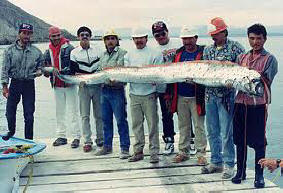 Fishermen
at Hatake Port, in the northwestern city of Oga,
Akita Prefecture, on Jan. 28 spotted a massive,
silver, snakelike fish near the surface. It took
four men to hoist the roughly 3-meter monster out of
the water. Staff members from the Oga Aquarium
determined it was an oarfish -- a species that
normally lives at least 200 meters deep.
Fishermen
at Hatake Port, in the northwestern city of Oga,
Akita Prefecture, on Jan. 28 spotted a massive,
silver, snakelike fish near the surface. It took
four men to hoist the roughly 3-meter monster out of
the water. Staff members from the Oga Aquarium
determined it was an oarfish -- a species that
normally lives at least 200 meters deep.Oarfish have washed ashore and been caught in nets in Japan before, but this was still a highly unusual event. "I have never heard of a deep-water fish being pulled up alive like this," said Shinji Handa, 37, a staff member at the aquarium. The fish, still able to move the dorsal fin along its back, swam around in a tank for a while but died the following day.
Down in Toyama Bay, also on Japan's northwestern coast, two oarfish have been caught this winter -- one in December and another on Feb. 7. The most recent one, a 1.5-meter specimen, has been cryogenically preserved at the Uozu Aquarium in Uozu, Toyama Prefecture. "We will examine its internal organs and what's left of its food to try to find out more about oarfish ecology," an aquarium official said.
On Feb. 25, fishermen working in fairly shallow waters in the Sea of Japan caught another resident of the deep: a giant squid. The slippery, 4.1-meter-long animal was snagged off Moroyose Port in the town of Shinonsen, Hyogo Prefecture.
Giant squids -- among the largest invertebrates on Earth -- have also been caught recently off Toyama and Niigata prefectures.
Moving on down the coast to Shimane Prefecture, a deep-water species called Trachipterus ishikawae, or slender ribbonfish, is being caught in relative abundance. A fishery company in the Shimane city of Matsue has fixed nets placed at 40 meters below the surface, and every day it snares up to a dozen slender ribbonfish. They usually live at depths of 200 meters or more and can grow to 2 meters or more.
Fishery workers in Sado, Niigata Prefecture, got a surprise Feb. 13 when they found a 4-meter cow shark in a fixed net. Cow sharks are considered primitive beasts; the local fixed-net fisheries cooperative sold the shark to a research institute in Ibaraki Prefecture through a wholesaler.
Anyone's guess
While unusual fish and other sea-dwelling species do turn up from time to time, all these cases appear to add up to a trend. The big question is, why?
Water temperature, perhaps? The Sea of Japan is 1-2 C colder than average. But an official of the Japan Sea National Fisheries Research Institute -- an entity under the Fisheries Research Agency, an incorporated administrative agency -- said water temperatures in fishing grounds near the coast have not changed from recent years. The official said the institute has yet to pinpoint reasons for the spate of strange catches.
Explaining that deep-water fish are not strong swimmers, the official did suggest one possibility: "They may have been brought to the surface due to ocean currents generated by strong northerly winds."





